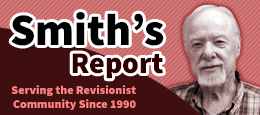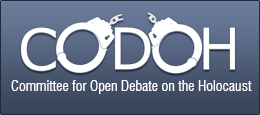by: Oren Segal
February 23, 2016
Holocaust denier Bradley Smith, the founder of the Committee for Open Debate on the Holocaust (CODOH), died on February 18, 2016, his 86th birthday. Smith’s lasting impact is apparent in his peers’ reaction to his death – and in the continued efforts of the organizations he created to promote dangerous Holocaust denial theories. Smith’s acolytes and fellow Holocaust deniers rushed to eulogize him in the days following his death.
Smith was one of the original Holocaust deniers – an aging group that included Willis Carto, who died in October and was buried in Arlington National Cemetery in February amid considerable controversy. Smith denied every fact about the Holocaust: He discounted the number of murders, he dismissed the gas chambers as “false,” and he questioned the existence of a planned “Final Solution.”
Smith had an eclectic, literary – even progressive – young adulthood, and did not engage in so-called “revisionism” until he was nearly 50, when he read a copy of Robert Faurrison’s “The Problem of the Gas Chambers.” The pamphlet, as Smith recalled in his memoir, “Confessions of a Holocaust Revisionist,” changed his life. From that moment on, Smith’s Holocaust denial was absolute – he refuted every piece of evidence that was presented to him, from eyewitness testimony to photographs of the concentration camps to historical documents – and he was determined to share his new beliefs widely, especially on college campuses.
David Cole, who also promoted Holocaust denial on campus in the 1990s, wrote this about Smith: “…He made his mark. Whether they know if it or not, those today who campaign for free speech on college campuses… all use techniques Bradley helped pioneer. Campus newspaper ads disguised as op-eds, calculatedly provocative speaking tours, pitting student idealists against ideologues… Bradley did it first.”
From 1987 to 2001, CODOH ran the Campus Project, Smith’s attempt to fuel Holocaust denial on university campuses by placing essay-length ads in more than 350 student newspapers. Smith’s efforts set off heated First Amendment debates nationwide.
In his homage to Smith, Holocaust denier Arthur Butz, a professor of electrical engineering at Northwestern University and author of “The Hoax of the Twentieth Century,” wrote of CODOH: “I call it a great success, because [Smith’s] kitchen-table operation has grown into the principal center of revisionism, publishing, posting or linking to articles in several languages and providing outlets for people who make worthy contributions… Congratulations and R.I.P., Bradley, for a life that made a difference!”
Holocaust denier Germar Rudolf, a longtime Smith collaborator, added these words of praise: “Bradley’s legacy is monumental. Among revisionists, there are few who have achieved as much as he has… He almost single-handedly made his own nation listen to the revisionist message, in spite of all establishment attempts to silence him.”
Smith’s impact reached beyond his peers to everyday “revisionists.” On the day after his death, an anonymous commenter posted condolences on the CODOH website: “Though I never knew him personally, I have read a bit of his work… May he rest well knowing that he lived a accomplished life fighting the wicked goliath that sends waves of propagation far…”
In recent years, Smith seemed determined to continue his work – and shore up his hateful legacy. In March 2015, he announced the creation of a new Holocaust denial website, A Light on Campus, which features the tagline: “As a student, with regards to the Holocaust narrative, you are being directed by academic taboo rather than intellectual freedom and a free press. Do you want to continue to support this taboo, or confront it?”
Even in the week leading up to his death, Smith was making noise: On February 10, 2016, Jewish students at the University of Vermont received an email questioning the record keeping at Auschwitz and claiming that one of the camp’s crematoriums was constructed after World War II. The message was signed by Bradley Smith.











